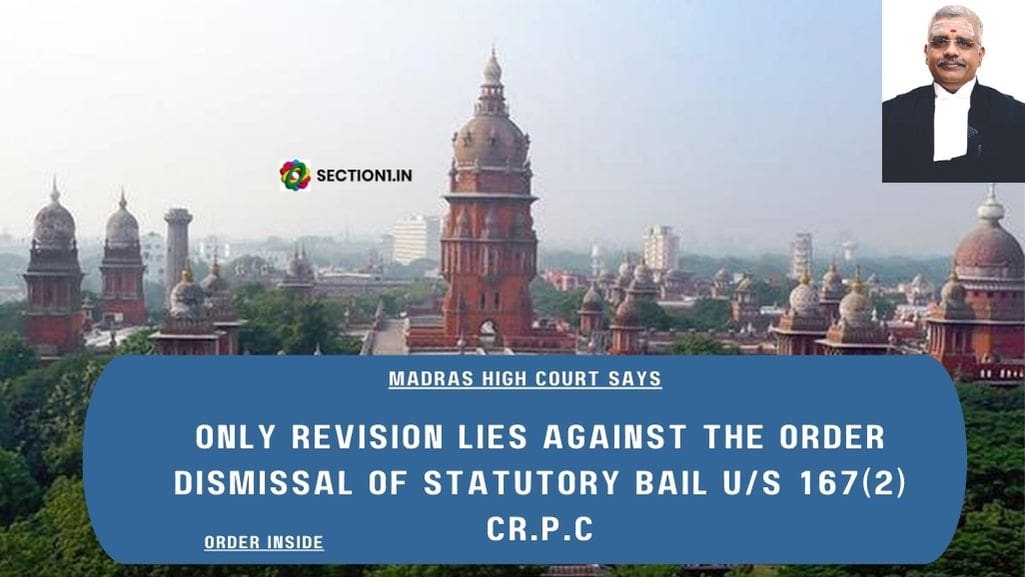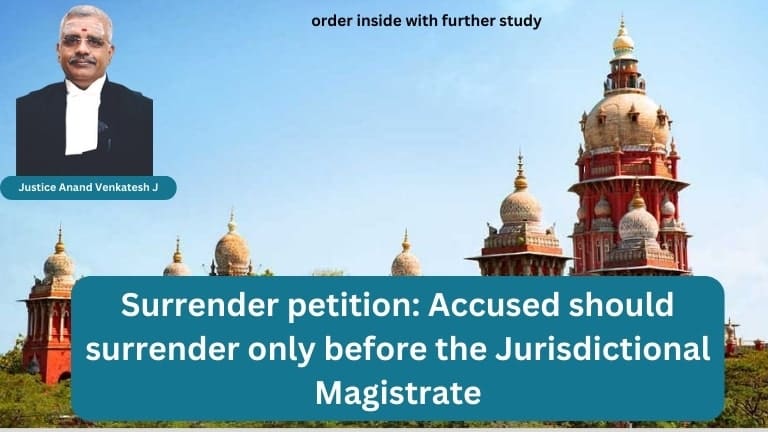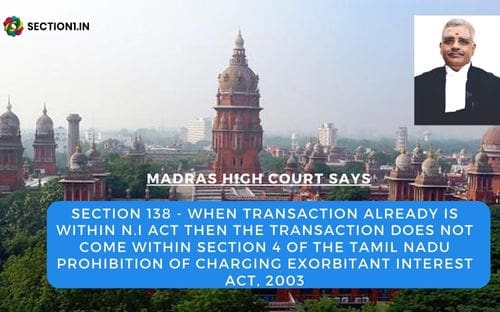4.The petitioner continued to remain in detention for more than 90 days from the date of remand and the respondent did not file any further report / supplementary report and hence, the petitioner filed an application seeking for statutory bail under Section 167(2) of Cr.P.C., before the Court below.
5.The Special Judge dismissed the application by order dated 28.06.2023 on the ground that the final report has already been taken cognizance and the petitioner was arrested only in the course of further investigation and therefore, the petitioner cannot claim statutory bail under Section 167(2) of Cr.P.C and at the best, the petitioner can only file a regular bail application which will be considered on the merits of the case. Aggrieved by the same, the present Criminal O.P., has been filed under Section 482 of Cr.P.C.
xxx
12.The learned counsel appearing on either side relied upon various judgments to substantiate their contentions. Insofar as the issue of maintainability of a petition under Section 482 of Cr.P.C., is concerned, the following judgments were relied upon.
(a) Madhu Limaye -vs- State (1997) 4 SCC 551
(b) Raj Kapoor and Others -Vs- State and Others (1980) 1 SCC 43
(c) Prabhu Chawla -vs- State of Rajasthan and Another (2016) 16 SCC 30
(d) Ratan Mandal -vs- State of Jharkhand (2005) SCC Online Jharkhand 460
(e) Anantha Sathya Udaya Bhaskara Rao -vs- State of Andhra Pradesh (2022) SCC Online Andhra Pradesh 2166
(f) Raja Bhaiya Singh -vs- State of Madhya Pradesh (2021) SCC Online Madhya Pradesh 27
(g) Ashok Munilal Jain and Another -vs- Assistant Director, Directorate of Enforcement, Chennai in Crl.R.C.No.387 of 2017 dated 14.03.2017.
13.Insofar as the issue of maintainability of an application under Section 167(2) Cr.P.C., post cognizance of a final report, the following judgments were relied upon.
(a) State -vs- Dawood Ibrahim Kaskar and Others (2000) 10 SCC 438
(b) CBI -vs- Rathin Dandapat and Others (2016) 1 SCC 507
(c) Achpal @ Ram Swaroop and Another -vs- State of Rajasthan (2019) 14 SCC 599
(d) Dinesh Dalmiya -vs- CBI (2007) 8 SCC 770
(e) CBI -vs- Kapil Wadhawan and Another (2023) SCC Online Delhi 3283
14.This Court will now consider the issue of maintainability raised by the learned Additional Public Prosecutor. It is contended that an order dismissing an application under Section 167(2) of Cr.P.C., substantially affects an important right that has been given or in other words indefeasible right that has been given to an accused person to be released on bail and such an order cannot be said to be an interlocutory order and hence, only a revision petition is maintainable, and the inherent jurisdiction of the High Court under Section 482 of Cr.P.C., cannot be invoked in view of an alternative provision that is available in the Code to challenge such an order.
15.Where an order is purely interlocutory in nature, the bar under Section 397(2) of Cr.P.C., operates. An accused person who is aggrieved by such an order generally invokes the inherent jurisdiction of this Court under Section 482 of Cr.P.C. It is now too well settled as to what is the nature of an interlocutory order. The judgments that were cited on either side makes it clear that there are broadly three types of orders that are taken into consideration. One is called the final order, where the order virtually brings the entire proceedings to an end. The other is called as a interlocutory order which is almost a converse of the term final order and such type of order does not bring the entire proceedings to an end. These orders are passed during the pendency of the main proceedings. There is a third category of order called as intermediate order. These are orders which are not in the nature of an interlocutory order and these orders also do not bring the entire proceedings to an end. However, such orders brings to an end a substantial issue that is involved in that particular application which is filed during the pendency of the main proceedings. For instance, a question of jurisdiction is raised during the pendency of the main proceedings or a discharge petition is filed during the pendency of the main proceedings on the ground that the final report does not make out an offence against the accused person. Any order that is passed in these types of applications will not bring the main proceedings to an end, but it certainly brings to an end that particular issue that has been raised, and it is finally decided by virtue of that order. These types of orders can be brought within the category of intermediate orders and not interlocutory orders. For such intermediate orders, the bar under Section 397(2) of Cr.P.C., will not apply.
xxx
17.In the case in hand, an application has been filed by the petitioner under Section 167(2) of Cr.P.C., seeking for statutory bail. It is trite law that while considering the statutory bail, the Court does not go into the merits of the case and the Court merely takes into consideration the fact as to whether the accused is in detention for 60 days or 90 days, as the case may be, and the final report has not been filed, and the Court recognizes the indefeasible right given to the accused person and release him on bail if the accused person is prepared to and does furnish bail. The Court does not get into any of the other issues while considering a statutory bail application.
18. If a statutory bail application is dismissed, it certainly involves the determination of an indefeasible right given to the accused person and such an order cannot be considered to be an interlocutory order and such order is more than a purely interlocutory order and less than a final disposal. The reason for rendering such a finding is that the accused person loses his right of being let out on a statutory bail and that right is lost by virtue of the dismissal of the application. However, that does not mean that the accused person is going to be kept under detention forever. The accused person can always file an application seeking for a regular bail and the same will be considered on merits and the Court may be satisfied that the accused can be enlarged on bail pending the main case. In such a scenario, the dismissal of the statutory bail application does not completely bring to an end the right of an accused person to be enlarged on bail, but such enlargement on bail at a later point of time happens on consideration of the merits of the case. Therefore, the dismissal of a statutory bail application under Section 167(2) of Cr.P.C., can be considered only as an intermediate order and not as an interlocutory order. Such order can be challenged by way of filing a revision petition and the bar under Section 397(2) of Cr.P.C., will not apply to such an order. In view of the same, this Court is in agreement with the judgment of the High Courts of Madhya Pradesh, Jharkhand and Andhra Pradesh on this issue.
19. The next question is that whether there is a complete bar for this Court to exercise its jurisdiction under Section 482 of Cr.P.C., against the order passed by the Court below dismissing the application under Section 167(2) of Cr.P.C. It is too well settled that there is no total bar on the exercise of inherent power where abuse of process of the Court or other extraordinary situation arises for the Court to exercise such a jurisdiction. The so-called limitation in the exercise of jurisdiction under Section 482 of Cr.P.C., is more in the nature of self restraint and nothing more. It will be useful to take note of the judgment of the Apex Court in this regard in Raj Kapoor’s case and Prabhu Chawla’s case referred supra. The availability of an alternative remedy of Criminal Revision under Section 397 Cr.P.C., by itself cannot be a ground to dismiss a petition under Section 482 of Cr.P.C. The Apex Court in Prabhu Chawla’s case has held that if the jurisdiction under Section 482 of Cr.P.C., is exercised only for petty interlocutory orders and all the orders can only be challenged by filing a revision under Section 397 Cr.P.C., it will have an unwarranted and undesirable result.
20. The instant case involves the indefeasible right given to the petitioner to be released on statutory bail and the same has been rejected by the Court below on an unsustainable ground which will be discussed herein below and it directly touches upon the right of liberty guaranteed under Article 21 of the Constitution and hence this Court is inclined to exercise its jurisdiction under Section 482 of Cr.P.C. The self restraint that is exercised by this Court under Section 482 of Cr.P.C., need not be extended to the facts of the present case and this case certainly warrants the exercise of jurisdiction under Section 482 of Cr.P.C. In other words, this Court is not inclined to reject this petition merely on the ground that the petitioner also has an alternative remedy under Section 397(2) of Cr.P.C. Thus, the issue of maintainability is answered in favour of the petitioner.
21. The second issue that is taken up for consideration is as to whether the petitioner is entitled to be released on statutory bail since his detention continues for more than 90 days and the additional report / supplementary report is yet to be filed before the Court below pursuant to the further investigation undertaken under Section 173(8) of Cr.P.C.
22. The Court below has come to a conclusion that the final report has been taken cognizance and hence Section 167 of Cr.P.C., which falls under Chapter XII will have no application since it confines itself only to the stage of investigation.
23. The accused person arrested in the course of investigation is governed by the rights provided under Section 167 of Cr.P.C., with respect to his custody / detention and his release / enlargement on bail relatable to Chapter XXXIII of the Code. If such an accused person is remanded after the Court takes cognizance of the offence on the filing of the final report, Section 309(2) of Cr.P.C., will come into play. In such a scenario, Section 167 which relates to pre-cognizance stage will have no applicability. To put it simple, where a charge sheet has not been filed and investigation is kept pending, the benefit under the proviso to Section 167(2) would be available to the accused person. Once, however, a charge sheet is filed, the said right ceases. Such a right does not revive only because a further investigation is pending within the meaning of Section 173(8) of Cr.P.C. The power of the Court to direct remand of an accused person either in terms of Section 167(2) of Cr.P.C or Section 309(2) of Cr.P.C. will depend upon the stage of the case. Section 167(2) would be attracted in a case where cognizance has not been taken. Section 309(2) would be attracted only after the cognizance is taken.
24. The key words which brings in the difference in the exercise of jurisdiction is “accused if in custody”, that appears under Section 309(2) of Cr.P.C. The term “accused if in custody” which appears under Section 309(2) of Cr.P.C., will apply only to those accused persons who were before the Court when the cognizance was taken or when the enquiry or trial was held in respect of such accused persons. Let us take the facts of this case to understand the scope of Section 309(2) of Cr.P.C. There were named accused persons in the FIR and the final report was filed against the 19 named accused persons. At the time of taking cognizance of the final report, if any of these accused persons is taken in custody and brought before the Court when the cognizance is taken, or when the enquiry or trial is held against those accused persons, Section 309(2) of Cr.P.C., will come into operation. Just because further investigation was undertaken by the respondent, that cannot be taken advantage of and such accused persons who are remanded by the trial Court cannot be allowed to take advantage of Section 167(2) of Cr.P.C., since insofar as they are concerned, it is at the post cognizance stage. However, if an accused person is subsequently arrested in the course of further investigation and such accused person was not shown as an accused either in the FIR or in the final report that was filed, insofar as he is concerned, it must be construed as a stage of investigation under Chapter XII of the Code and as a consequence, Section 167(2) of Cr.P.C., can be made applicable.
27. It is pellucid from the above judgments that the expression “accused if in custody” in Section 309(2) of Cr.P.C., does not include the accused who is arrested on further investigation before supplementary charge sheet is filed. In the light of the settled law, the Court below was not right in rejecting the statutory bail application filed by the petitioner under Section 167(2) of Cr.P.C., since the petitioner was not an accused before the Court when the final report was filed and the cognizance was taken and the petitioner is now being added as an accused and arrested in the course of further investigation under Section 173(8) of Cr.P.C., before the supplementary charge sheet is filed. In view of the fact that the detention of the petitioner is continuing beyond 90 days and the supplementary charges sheet has not been filed, the petitioner is certainly entitled for the indefeasible right provided under Section 167(2) of Cr.P.C., and the petitioner must be enlarged on statutory bail if he is prepared to and does furnish bail. The second issue that was taken up for consideration is also answered in favour of the petitioner.
PARTY: Gnanasekaran Thiyagaraj vs State Rep.by The Deputy Superintendent of Police Economic Offences Wing (EOW-II) Police Training College Ashok Nagar Chennai 600 083 (Crime No.16 of 2022) – Criminal Original Petition No.16024 of 2023 – 16.08.2023.
https://www.mhc.tn.gov.in/judis/index.php/casestatus/viewpdf/1061231
Gnanasekaran Thiyagaraj vs. State – Crl.O.P No 16024 of 2023 – 16.08.2023






